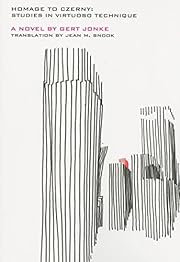

Click on a thumbnail to go to Google Books.
|
Loading... Homage to Czerny (1977)by Gert Jonke
 None No current Talk conversations about this book. no reviews | add a review
Gert Jonke's prose ripples along like a piano #65533;tude, transcending its meticulously constructed sequences to transport the reader into an imaginary world. With a delightful combination of the ridiculous and the sublime, Jonke explores surreal dimensions of space and sound, always anchoring his flights of fancy in accessible imagery. More than any other author, Jonke, a pianist turned writer, avails himself of compositional techniques from classical music. Different characters sound their own themes in cleverly orchestrated conversations. Opening observations are restated at the end by another character instead of in another key. Not surprisingly, the first-person narrator is a composer, a young man who is all the more likeable for his difficulties: his missing girlfriend and his withdrawal symptoms. The title is taken from a collection of studies by Carl Czerny; the content is a literary tour de force. No library descriptions found. |
Current DiscussionsNonePopular covers
 Google Books — Loading... Google Books — Loading...GenresMelvil Decimal System (DDC)833.914Literature German & related literatures German fiction 1900- 1900-1990 1945-1990LC ClassificationRatingAverage: (3.73) (3.73)
Is this you?Become a LibraryThing Author. |
||||||||||||||||||||||||||||||||||||||||||||||||||||||||||||||||||||||||||||||||||||||||||||||||||||||||||||||||||||||||
In the first and longer section two siblings are giving a party. Just as the paintings they've hung about their estate precisely duplicate the views that they obscure, the party will, they hope, down to each word and gesture be indistinguishable from the party they gave exactly one year before. The premise is all the more intriguing because the painter of the oils and the narrator, an unnamed composer, are the only guests who know of their hosts' intention.
The rest of the book describes the visit a composer (who may or may not be the same narrator) and his brother pay to the music conservatory where they both studied. In the attic from which they cannot escape they find dozens upon dozens of pianos allowed to fall into a state of desuetude.
I was a bit more taken with the first section, perhaps because the second was slightly more conventional: The characters in the latter were better-drawn, the events less unlikely, and the conversations less surreal than in the first.
I don't know whether I'll have remembered the novel as a whole six months from now, but I don't think I'll have forgotten the eeriness of the North city, the smokestacks of impossible heights, the unearthly weather patterns and the wonderfully absurd explanations for them.